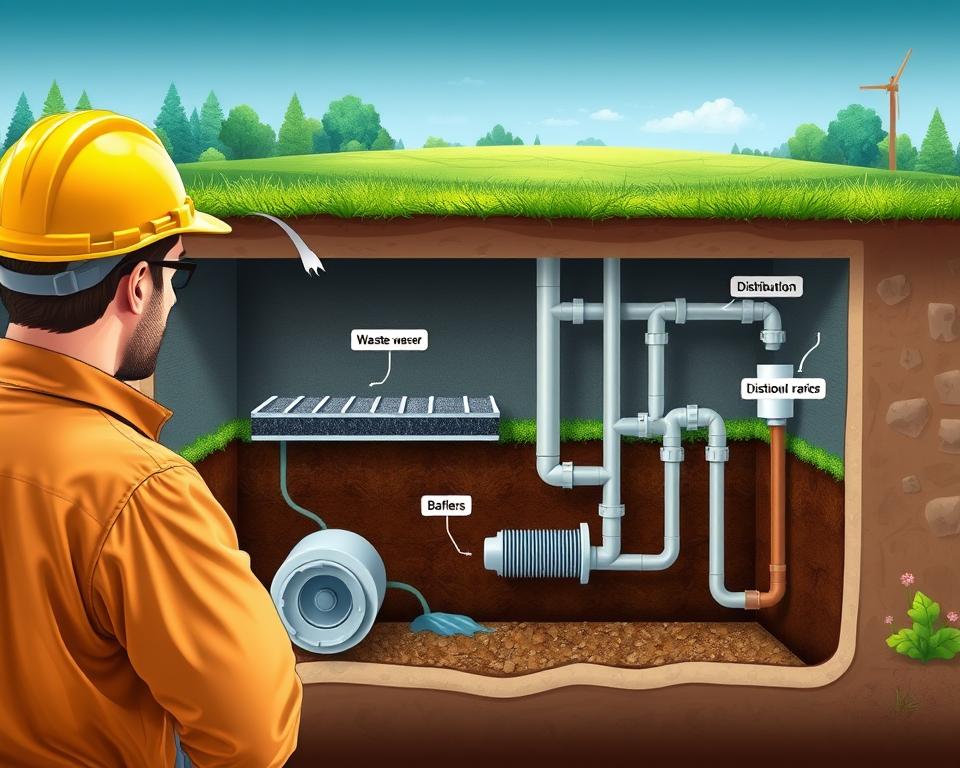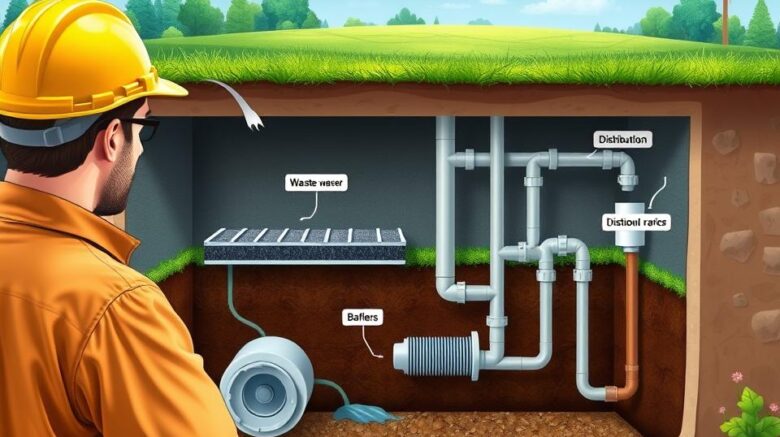Septic System Cleaning
Do you ever wondered regarding the ramifications of ignoring septic system upkeep? For those who use these systems for wastewater treatment, missing scheduled care can cause substantial costs. It also introduces dangers to both well‑being and the environment. Cleaning your septic system is far from a basic task; it’s crucial for making sure your household operates smoothly. By consistently emptying your septic tank, you prevent sediment accumulation and lengthen the longevity of your setup. This proactive approach helps you sidestep any troublesome scenarios. Discover the value of septic tank maintenance and the process involved with septic tank cleaning near me.
Major Takeaways
- Regular septic system pumping is vital for avoiding hefty repairs.
- Ignoring upkeep can cause dangerous conditions for your loved ones.
- Knowing your septic system aids in effective stewardship.
- Signs of a failing septic system should be identified promptly.
- Licensed contractors can support in preserving optimal tank health.
Understanding Your Septic System
A septic system is an effective on‑property approach for treating wastewater. It mainly includes two components: the septic tank and the leachfield. Both are vital for providing proper sanitation and safeguarding the ecosystem.
The septic tank collects wastewater from your home. Inside,, solid particles drop to the bottom, and effluent drift to the surface. Bacteria within the tank decompose the organic material, making the effluent simpler to treat. This pre‑treated wastewater then flows to the leachfield for further purification by the ground, completing the cleanup.
It’s vital for homeowners to grasp the workings of their septic system. Grasping how the septic tank and field work in tandem can foster better system care. This understanding encourages effective maintenance practices, supporting the system’s longevity.

Value of Routine Septic System Cleaning
Routine cleaning of the septic system is essential for household and ecological health. If overlooked, unprocessed wastewater can spill into your yard. This spillage might lead to groundwater contamination, creating health risks. By keeping the septic system clean, you shield your household and the environment.
It’s recommended to pump the septic system every three‑to‑five years, depending on how much you use it. Such maintenance is not just eco‑friendly; it heads off big bills. A septic system that’s regularly serviced operates better, providing a safer household and a safer environment.
Indicators Your Septic Tank Needs Cleaning
Homeowners need to recognize signals that their septic tank may need pumping. Key signals to monitor include:
- Sluggish draining in basins, bathtubs, and lavatories
- Bad odors near the leachfield
- Wastewater returns in indoor pipes
- Persistent wet areas or extra‑green areas of grass on top of the septic system
It’s essential to identify these signs early to avert major septic tank failures. Routine inspections are essential. They find issues before they escalate to costly repairs. Checking your system periodically guarantees it works well and survives longer.
Keeping watch and responding quickly are key for septic system care. By paying close attention to these red flags, you can maintain your septic system in top shape.
Septic System Pumping Frequency
Cleaning your septic system consistently is fundamental to keeping your home’s plumbing in excellent condition. Professionals typically advise servicing the septic tank every three to five years. However, this can differ depending on the capacity of your household, how much usage you have, and the size of your tank.
If you have a big household that uses more water, you may require to pump the system at shorter intervals. Tracking your water usage can let you determine if you need to modify your cleaning schedule.
All in Sanitation recommends setting up a steady pumping schedule that suits your household’s specific needs. Sticking to a routine maintenance plan maintains your septic system functioning smoothly and prevents expensive repairs.
Septic System Cleaning: Best Practices
For a septic system to keep sound, homeowners must observe important practices. It’s essential not to flush non‑degradable materials; doing so stops clogs and keeps the system functioning properly. Similarly, minimizing household chemical usage preserves the essential bacterial population. These actions are key for the system’s life span and performance.
Being proactive with scheduled inspections is crucial. Scheduling routine assessments can catch issues early, facilitating prompt solutions. Additionally, conserving water through repairing drips and careful usage supports septic tank health. These practices guarantee the system functions efficiently for a long time.
It’s also essential not to place heavy loads on the leachfield. Leaving this area unobstructed lets it adequately handle waste water, protecting your system from issues. Heeding advice from professionals like All in Sanitation also enhances septic system care.
The Process of Septic Tank Pumping
For homeowners, grasping the septic system service process is important. A licensed septic pumper should handle scheduled septic tank pumping to maintain your system operating properly. The first step is evaluating the tank’s state to see when it needs pumping.
A septic tank requires pumping once the solids take up about 1/3 to 50 percent of its volume. The licensed septic pumper will then clear out these solids. This action preserves the system’s effectiveness. Furthermore, the appointment may include examining the tank for incipient issues, allowing for prompt fixes.
Keeping a record of each pumping session is advisable. This log lets owners monitor their septic system’s maintenance, and is valuable if selling the property. Adequate septic system maintenance improves its service life and reliability, preventing hefty fixes down the line.
Septic Tank Check‑Up: What to Look For
Scheduled inspections are crucial for your septic system’s health. Using a detailed septic tank inspection checklist can detect latent issues promptly. Inspections should be performed by a licensed contractor every one‑to‑two years. They will measure sludge buildup and the scum layer’s condition during this time.
Inspecting the baffles and outflow filters is also crucial. These parts are essential for your septic system’s proper operation. Finding seepage or malfunctions early can prevent high repair costs. Preventive steps, like using an inspection checklist, boost your system’s longevity and efficiency.
Specialized Septic System Services
Utilizing professional septic system services is crucial for your septic system’s integrity. By selecting a company like All in Sanitation, you make sure that experts take care of the cleaning, check‑ups, and fixes carefully. Accredited technicians carry specialized knowledge, helping homeowners to keep the system’s optimal functionality over the years.
Upkeep by qualified pros lowers the likelihood of surprise failures and hefty restorations. These services incorporate comprehensive inspections that assess the system’s state, locating incipient problems promptly. Adopting this preventive approach greatly prolongs your septic system’s service years.
Ultimately, entrusting your septic system to qualified experts offers peace of mind. Working alongside companies such as All in Sanitation utilizes their expertise. It guarantees the health of your tank, building trust in its maintenance.
Septic System Maintenance Advice for Homeowners
Homeowners have the capacity to ensure their septic systems running efficiently. Using efficient care tips markedly boosts their function. Introducing easy tweaks to how we use water, like cutting down on unnecessary use and spreading the use of appliances, lessens load on the system.
Fitting efficient fixtures in your washrooms and cooking areas noticeably helps septic longevity. These fixtures decrease water use without compromising convenience. Skipping garbage disposals is smart too, as they cause more residue in the system, requiring extra upkeep.
Consistent inspections and sticking to a thorough maintenance plan will lengthen your septic system’s life. Paying attention of everything that goes down your drains is essential for keeping a balanced septic environment. By adopting these measures, you’ll greatly boost your septic system’s operation and lifespan.
Common Septic System Fixes
Septic systems may encounter various troubles over time, necessitating repairs. Common concerns involve fluid loss, broken baffles, and drainage issues in the absorption area. By spotting the signs at an early stage, homeowners can address them rapidly, ensuring their system is in solid condition.
Standard repairs consist of:
- Replacing faulty components to restore system integrity
- Repairing or changing cracked conduits to prevent leaks
- Unblocking clogged lines to ensure proper drainage
Addressing septic issues quickly not only lowers costs over time but also extends the system’s service years. Routine check‑ups and maintenance can avoid these problems, aiding in the care of a healthy septic system.
To Conclude
Preserving your septic system robust is central to ecological and personal well‑being. Regular pumpings and examinations avert costly fixes and dangers. Acting early with septic care conserves resources and reduces concern.
Employing professionals like All in Sanitation ensures high‑quality upkeep tailored for your system. Their expertise assists catch issues promptly, averting major troubles and highlighting the need for scheduled inspections.
Following effective habits for septic maintenance promises long‑term system performance. A little maintenance today secures a more reliable septic system in the future.
